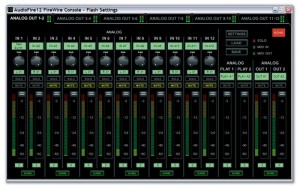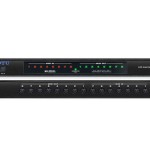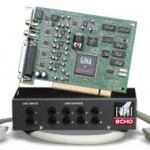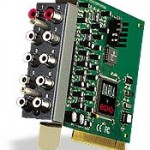
The AudioFire12 has 12 balanced analog inputs and outputs (TRS), 2 FireWire ports, MIDI I/O, word clock synchronization, and 12 channels of full duplex 24 bit 192kHz recording and playback.
I have three of these in the studio for 36 analogue ins/outs.
I decided on these as my main interfaces for several reasons. For one, I’ve had an Event Echo Darla interface for years. I was always impressed that Echo maintained drivers for these cards (which came out around 1996). The drivers for the Darla were always rock solid so I figured the Audiofire12 would be in the same category.
Researching on several forums and websites I was reading really good reviews on the digital converters in these devices. The ASIO drivers were solid people were very pleased. Considering my past experience with my Darla card, I was sold.
I have my main recording workstation and console configured almost more like a traditional analogue recording setup. I do very little mixing or processing of audio signal on the computer. Everything is recorded to track and then pushed to the console for mixing. With this configuration what I needed mostly were a pile of analogue outputs from the recorder to the console. The Audiofire12 gives me this.
The Audiofire12 software console utility is really lightweight. Echo didn’t feel the need to add a bunch of frilly nonsense to make it pretty and flashy. It is straight forward and does the job. I wish more companies would take this route.
I have only two minor complaints on the Audiofire12. It runs a little hot. I have to space these one rack unit apart to keep them cool. This isn’t a big deal really.
The other issue I had was when I first installed them. I had just assembled a new workstation for my recorder (two quad core Xeon CPUs on a Asus server motherboard with 8 GB of ECC RAM) and had a clean install of Windows XP 64 bit. The driver install procedure would fail with an error I don’t remember at the moment. I fought with this for several hours and could not get the Audiofire drivers working. At the time I had a MOTU 828mkii so I decided to give that a go on the new system. It installed with no problem. I then installed the Audiofire drivers in WinXP 32 bit.. no problems.
Banging my head against the desk I gave the Audiofire drivers another shot in WinXP 64bit. Bing, bang, boom.. they installed and worked flawlessly. It seems the issue had something to do with an audio element which was missing in WinXP 64bit base install. The server motherboard has no audio at all so Windows (I guess) didn’t bother installing anything. When I installed the MOTU interface the needed Windows elements were installed.
It was something like that. I did this over a year ago so I don’t really remember all the details. All I know is if you want to get the Audiofire12 running under WinXP 64bit make sure all of Windows multi-media stuff is working. Then you shouldn’t have any problem.
Acquired: 2009







Recent Comments